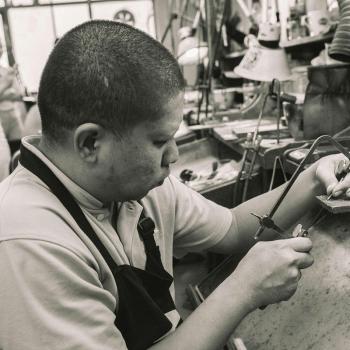The death of performer Leslie Jordan saddened many who enjoyed his performances on Will and Grace, Raising Hope, Call Me Kat, and many more TV shows and movies. The actor with 133 credits to his name was pronounced dead on October 24, 2022, at the age of 67, after a car crash, according to the Los Angeles Times. Jordan’s Southern drawl, diminutive height, and quick humor made him an entertainer beloved by millions.

Trying to Drown Out the Gay
But behind his humor, Jordan often shared the pains of his religious upbringing. Raised in a strict Southern Baptist church, Jordan struggled with his denomination’s teachings about the sinfulness of homosexuality. PrideSource says that Jordan joked that he was baptized 14 times “trying to drown out the gay.” (He joked—but it was true.) According to People, Jordan said:
“When I’m being very dramatic, I say, ‘Well, I grew up in the church, but I walked away,’ because the whole gay thing came around. I firmly believe that God made me this way. I’m not a mistake…This is not my cross to bear. It’s part of what I am and I want to celebrate that, but when you grow up and you’re just so scared… But I never walked away from the church,” he added. “I just quit going.”
Southern Baptist Sissies
Later in life, Jordan processed his experience in the Southern Baptist Church by producing and starring in Southern Baptist Sissies. TheaterMania describes the play and later film as “A tale of four young Southern Baptists (who also happen to be gay boys), the play is a heartbreaking and hilarious look at the lives of gay men under the stifling influence of fundamentalist religion.” But as much as Jordan is known for his humor, his role was not comedic. Instead, the show he created is a tragic story of fundamentalist religion that squashes the spirit of LGBTQIA+ folks, condemning them to hell for loving the way God made them to love. Leslie said that the theme of the show was drawn from his own experience.
As much as I’d like to write more about Leslie Jordan, many writers with more information have already done so. I hope you’ll do some internet digging and find the treasure that is Leslie Jordan. At this point, I’ll move on to others who struggle the same way Jordan did.
Being Southern Baptist and Gay
As a Baptist pastor, I knew many LGBTQIA+ people in the churches I served—but they were all closeted. One couple connected with me as “their minister,” even though they never darkened the doors of the church. They knew they would be rejected and judged. Even so, I cared for them, up to the end when one of them passed away. The surviving partner asked for a church funeral, and I agreed. You’ve never seen so many gay people packed into one Southern Baptist church! But of course, none of the church members knew about it, because they would never have welcomed the couple as visitors, much less as members. Since they didn’t know the name in the local obituary, they didn’t attend the funeral in which I declared that the couple’s love was inspirational. I wish they’d known this couple—the church might have learned as much as I did from their love.
It’s hard to count how many lesbian, gay, bi, trans, queer, asexual, and intersex people I have known, who were members of Southern Baptist churches. All of them were in the closet because they knew if they came out, they would be harassed, bullied, and ostracized. Without outing them by giving hints, I’ll simply say they were in all areas of the church, from the youth group to leadership. Some were sexually active with same-sex partners. Others believed they were called to celibacy. All of them understood the code of silence necessary within the conservative community.
Once, a church member came up to me in the grocery store and tried to strike up a conversation about one of them. “Did you know that they’re gay?” the church member said.
“How do you know that,” I asked. “Did they tell you?”
“Well, well—no!” the accuser stammered. “I can just tell!”
Ignoring the woman’s correct gaydar, I replied, “Unless somebody tells you then it’s none of your business.”
I walked away from the busybody to a different aisle, while she clutched her pearls and muttered, “Well, I never!”
The fact is unless somebody tells you, then it’s none of your business. And even if they do tell you, it’s not your place to judge. If you’re a member of a Southern Baptist church, I promise you that there are queer folks in your church. But it’s none of your business. Because if Jesus thought it was any of your business, he’d have said so. And Jesus never once mentioned it as a problem. When you bring it up as a problem, you’re the one with the problem—not the gay guy that Jesus never thought to condemn.
What Do You Hope to Accomplish?
I want to ask conservatives who like to condemn LGBTQIA+ folks, what do you hope to accomplish? People like Leslie Jordan, and like most of the queer folks in the Baptist churches I served, don’t hear your condemnation and say, “Oh, gee, I guess I need to repent.” Instead, they usually love you through your judgementalism until they can’t take it anymore. Then they give up, and they leave the church. If you think your condemnation is going to lead them to repentance, you’re wrong. All you’ve accomplished is driving them away.
Love and Understanding
Instead of judging them, it’s best to try to understand them. Click here to read “The Bible, Christianity, and Homosexuality”, by Rev. Justin Cannon. It’s a half-hour read, which is long for a web page. But it’s one of the best articles I’ve come across, dealing with the “clobber passages,” those seven scriptures that conservatives use to condemn queer folks.
Beyond understanding them, try loving them unconditionally. Without expecting them to conform to your morals, give them your unqualified regard. This means that you quit trying to convince them that they’re wrong and let them be who they are. If they’re wrong, that’s for God to show them. But if they’re right, and you’re misinterpreting the Bible according to an ancient religious moralism, then you’ll be doing irreparable harm with your condemnation.
Challenging the Church
As fun-loving as Leslie Jordan was, he couldn’t laugh off the judgment of the church. He eventually left, because the Christians he knew weren’t behaving very much like Jesus. He’s gone now, but the story of Southern Baptist Sissies remains—challenging the church to think twice about the way we treat LGBTQIA+ folks. Today I ask you—what if Jesus can no longer laugh off the judgment of the church, and also eventually leaves? The Jesus of the Gospels seemed to have more in common with the outsiders than the religious elite. If the church continues on its current path, it just might find Jesus gone—along with all the Southern Baptist Sissies.













